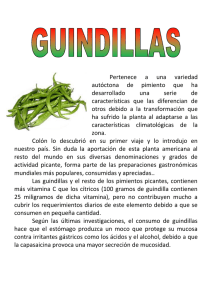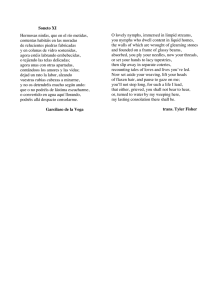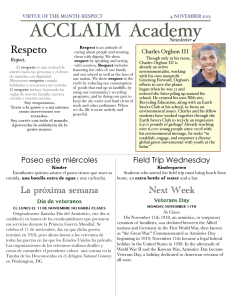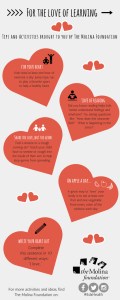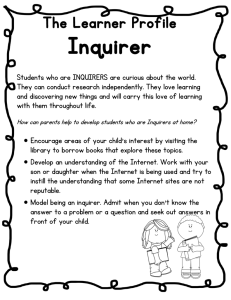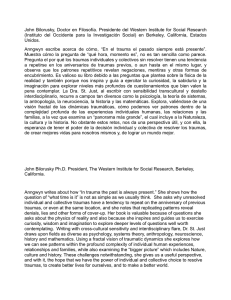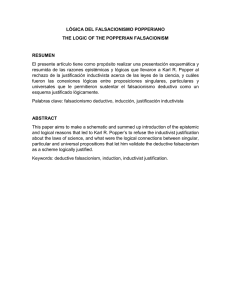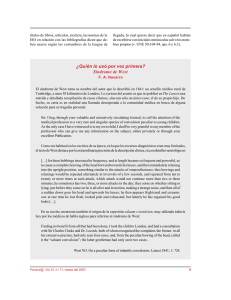File - Nuestro Portal de ESOL
Anuncio
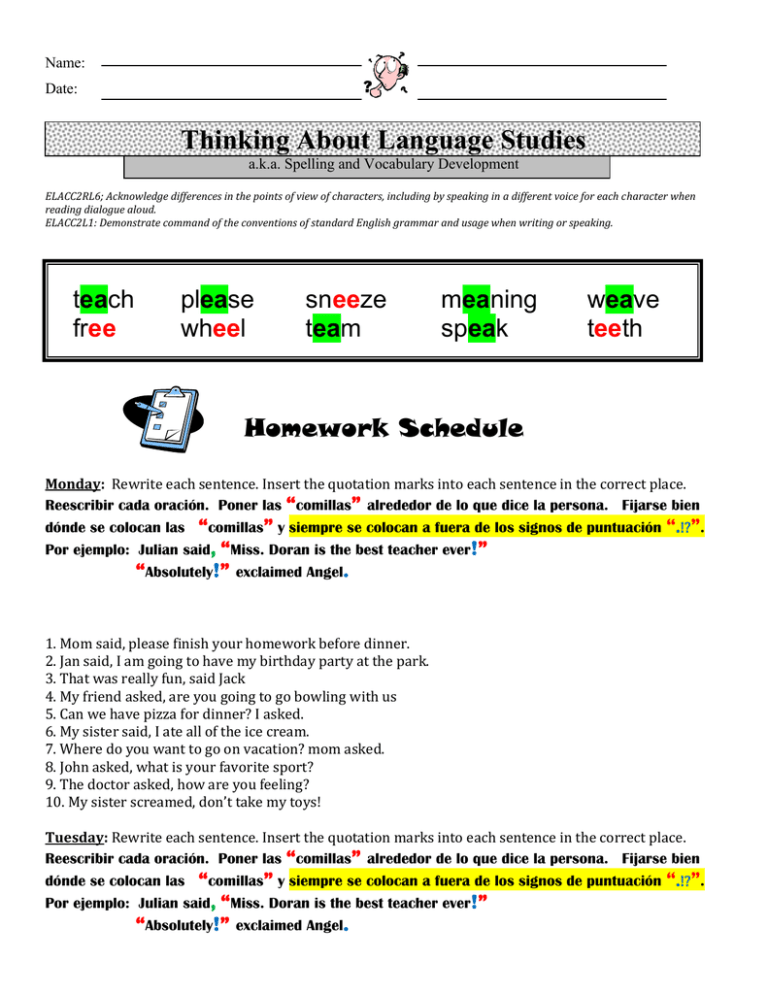
Name: Date: Thinking About Language Studies a.k.a. Spelling and Vocabulary Development ELACC2RL6; Acknowledge differences in the points of view of characters, including by speaking in a different voice for each character when reading dialogue aloud. ELACC2L1: Demonstrate command of the conventions of standard English grammar and usage when writing or speaking. teach free please wheel sneeze team meaning speak weave teeth Homework Schedule Monday: Rewrite each sentence. Insert the quotation marks into each sentence in the correct place. Reescribir cada oración. Poner las “comillas” alrededor de lo que dice la persona. Fijarse bien dónde se colocan las “comillas” y siempre se colocan a fuera de los signos de puntuación “.!?”. Por ejemplo: Julian said, “Miss. Doran is the best teacher ever!” “Absolutely!” exclaimed Angel. 1. Mom said, please finish your homework before dinner. 2. Jan said, I am going to have my birthday party at the park. 3. That was really fun, said Jack 4. My friend asked, are you going to go bowling with us 5. Can we have pizza for dinner? I asked. 6. My sister said, I ate all of the ice cream. 7. Where do you want to go on vacation? mom asked. 8. John asked, what is your favorite sport? 9. The doctor asked, how are you feeling? 10. My sister screamed, don’t take my toys! Tuesday: Rewrite each sentence. Insert the quotation marks into each sentence in the correct place. Reescribir cada oración. Poner las “comillas” alrededor de lo que dice la persona. Fijarse bien dónde se colocan las “comillas” y siempre se colocan a fuera de los signos de puntuación “.!?”. Por ejemplo: Julian said, “Miss. Doran is the best teacher ever!” “Absolutely!” exclaimed Angel. 1. Maria said, Where are we going? 2. Are you feeling better today? asked Carrie. 3. I’m going to Six Flags! screamed Ben. 4. I love the smell of tulips, said Melanie. 5. She whispered, What did the teacher say? 6. Clean your room! yelled mom. 7. I’m sleepy, said Rachel. 8. Help me! she cried. 9. I bought a cute shirt, said Monica. 10. Ross asked, Do you have any gum? 11. This pizza is delicious! exclaimed Joey. 12. Is that your ruler? asked Olivia. Wednesday: Practice typing your LS words (3 times each). Each time you type them, change the color and the font. Practica en la computadora y tipiar cada palabra 3 veces cada una. Cada vez que tipeés una cambia de color y de tipo de letra. Ejemplo: teach teach teach team team team Thursday: The following sentences have errors and are missing or need corrections with the placement of quotation marks, commas, periods, exclamation points, question marks, and or capitalization. Rewrite each of the sentences correctly. Las siguientes oraciones tienen errores y le faltan o necesitan correcciones con la colocación de las “comillas”, comas, puntos(.), signos de exclamación (!), signos de interrogación (?) y o capitalización. Vuelve a escribir cada una de las oraciones correctamente. 1. Heather asked, What are we going to do in math today? 2. “Dad said, we should play a game after dinner.” 3. Can we have pancakes for breakfast, asked Ivy. 4. “Your necklace is beautiful”! said Jenny 5. “Are Candice and Marla best friends” asked Gavin? 6. “Stop being mean! she cried”. 7. This summer my family is going to the beach. said Kara 8. Wade sighed “I still don’t understand”. 9. Did you see that, asked Marvin? 10. “Nathan exclaimed, we’re finally here!” Friday: Be ready to take your Language Studies test today! Reglas de cómo se utilizan las comillas. Durante un dialogo, abra comillas cada vez que cambie el personaje. Las comillas también se utilizan alrededor de los títulos de libros, canciones, poemas, historias y revistas. El nombre de una novela: “Sarah, Plain and Tall” “I notice we are still working on quotation marks,” said Jordan. “I remember the rules from last week!” exclaimed Eric. “Someone’s exact words are called a direct quotation,” said Maribel. “It is very important to determine if quotation marks are actually needed,” Angel replied. “It is important to begin a new paragraph when including dialogue in our writing.” “I’ve notice another place where quotations are used,” Hanya replied. “They are used around the titles of books, songs, poems, stories, magazine articles, and newspaper articles.” Los chicos deben de repasar los portales todos los días. Que ellos escojan los que más les gusten para repasar. Portales en YouTube: http://www.watchknowlearn.org/Category.aspx?CategoryID=1568 http://www.youtube.com/watch?v=OLB1IUNdoSE http://www.youtube.com/watch?v=bfU0Aaz464k http://www.youtube.com/watch?v=bcnvUyGqiHQ http://www.youtube.com/watch?v=SBO6fKfPuRg http://www.youtube.com/watch?v=RPB0pvd3eDQ www.spanishdict.com/translate/wonder www.dictionary.com Siempre mirar estos portales para la pronunciación. Nota: Los estudiantes tienen que escribir las palabras que saquen incorrecta de la prueba de diagnóstica cinco veces cada una. Al final de la hoja miren las diferentes formas que lo pueden hacer. Darle una prueba de diagnóstico todos los días. Como siempre, si tienen preguntas, se pueden comunicar conmigo a través de mi correo electrónico echauzi@fultonschools.org o me pueden llamar al 404-545-0350. ¡Gracias!
